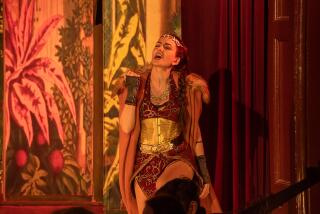THEATER REVIEW
Nothing gratified the Baroque Italian mind-set more than a beautiful freak. Waterborne cities with no logical right to exist, sculpture so realistic that it practically sprang to life and male singers whose lack of a certain anatomical endowment gave their voices a haunting ethereality were meat and drink to pre-Enlightenment hipsters in Rome and Naples.
Mexico’s Teatro de Ciertos Habitantes simultaneously celebrates and spoofs this singular aesthetic fetish in “Monsters and Prodigies: The History of the Castrati,” the brilliantly conceptualized, ravishingly performed ensemble piece that opened Wednesday night at REDCAT.
Like the falsetto-voiced young men who were castrated in the service of art, “Monsters and Prodigies” is a sublime hybrid, neither fully opera nor fully play, a grand diva with the soul of a circus clown. Imagine a riveting academic lecture being staged in the middle of a lucha libre smackdown, with a food fight erupting near the end, and you’re getting warm.
Written by Jorge Kuri, who died barely into his 30s in 2005, and directed by Claudio Valdes Kuri (no relation) in an appropriate style of barely restrained comic frenzy, “Monsters and Prodigies” syncretizes witty banter with raw scatological sight gags, uproariously vulgar vaudevillian slapstick with erudite analysis (mainly in Spanish, with overhead projections in English) as it lays out the rise and fall of a being “who embodies both sexes without enduring either’s limitations.”
A show as densely embroidered with the history of ideas as this one needs to impart its lessons lightly. It does, thanks to a group of instructors that includes the opera buffa composer and harpsichordist Baldessarre Galuppi (Edwin Calderon); Chiron (Miguel Angel Lopez), the centaur who taught Hercules; a pair of Siamese twins (Raul Roman and Gaston Yanes), whose contrapunto bickering suggests a racier, more elaborately peruked version of the Gabor sisters; and Sulaiman (Kaveh Parmas), who may or may not be the prophet Solomon, and is mistaken by the twins for a slave. (So many exotics to tame and conquer, so little time.)
Controversial men
The indefatigable seven-man cast puts this potentially overly cerebral show through its paces with a roughhouse athleticism, without ever breaking stride, passing up the chance for a well-timed spit or body slam or interrupting the periodic dressage maneuvers of a live horse. Perhaps the single most exquisite tableau in this preternaturally gorgeous show occurs when that horse, with its rider, canters around the stage while the virtuous castrato (Javier Medina, in rouged cheeks, resplendent plumage, fake armor and fine countertenor voice) lets loose an aria from Handel’s “Ariodante.”
Later, when Napoleon Bonaparte (Luis Fernando Villegas) turns up on that same horse, it’s a sign that the erotically ambiguous era of the castrati is over.
Like the coupling of man and beast (for carnal, rather than aesthetic purposes, that is), castrati frequently were denounced as an abomination of God and nature’s law. Voltaire loathed them. So did most French Republicans, who saw castrati as a symptom of Italy’s unmanly decadence.
But castrati were embraced (for a while at least) by the Roman Catholic Church, which was happy to endorse a new counter-reformation art that might shock and awe the masses into breaking with the dour Protestants and returning to the papal fold.
“Monsters and Prodigies” replicates that strange power through Matias Gorlero’s sculpted, chiaroscuro lighting, which gives the performers the heightened theatricality of allegorical figures in a Rubens painting. The show’s creators revel in “the gripping exteriorization of pathos,” a wonderful phrase that surely would bring a smile to the lips of Pedro Almodovar, John Waters and other contemporary connoisseurs of all that is erotically misshapen and grotesquely beautiful.
Their song is over
Ultimately, of course, the Napoleonic classicists, with their passion for blood and iron and Greco-Roman colonnades, would lose the game, and the feminization of Western culture would be officially sealed during the Victorian era.
But by then the poor castrati already were a dying breed, soon to vanish forever. Like this unforgettable evening of theater, their glory was short-lived, improbable and incapable of reproduction.
--
--
‘Monsters and Prodigies’
Where: REDCAT, 631 W. 2nd St., Los Angeles
When: 8:30 p.m. Friday and Saturday, 3 p.m. Sunday
Price: $25 and $30
Contact: (213) 237-2800
Running time: 1 hour, 40 minutes
More to Read
The biggest entertainment stories
Get our big stories about Hollywood, film, television, music, arts, culture and more right in your inbox as soon as they publish.
You may occasionally receive promotional content from the Los Angeles Times.











